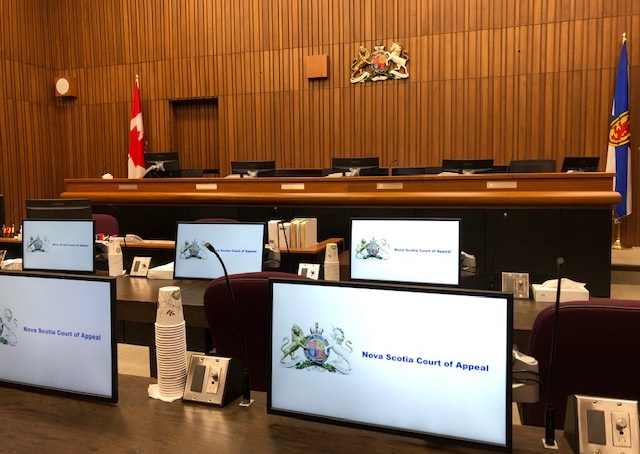The Nova Scotia Court of Appeal is the province's highest court. Through its judgments, the Court of Appeal clarifies and develops the law in Nova Scotia. The Court sits primarily at the Law Courts building in Halifax.
The Role of the Court of Appeal
The Court of Appeal hears appeals in civil, criminal and family matters from the Nova Scotia Supreme Court, and in criminal matters from the Provincial Court and the Youth Justice Court. It also hears appeals of decisions by tribunals, such as the Workers' Compensation Appeal Tribunal, the Nova Scotia Utility and Review Board, and the Nova Scotia Human Rights Commission.
 The Court of Appeal does not re-try cases. It reviews the record of the lower court or tribunal for errors of law or other errors that require appellate intervention.
The Court of Appeal does not re-try cases. It reviews the record of the lower court or tribunal for errors of law or other errors that require appellate intervention.
The Court has the authority to dismiss the appeal, thereby confirming the decision of the lower court or tribunal; to allow the appeal and order a new trial or hearing; or to allow the appeal but change the order of the lower court or tribunal. It is generally the court of last resort, except in the very few cases that further appeal to the Supreme Court of Canada.
Addressing Judges on the Court of Appeal
Many judges prefer to be addressed in a gender-neutral fashion. Counsel should consider doing so by using the term “Justice”, followed by the jurist’s last name. The gender-neutral term “Court” is also acceptable, as in: “I would like to direct the Court’s attention to…”. This is particularly useful in appeal hearings where a panel of three or five judges may be presiding. Unless otherwise directed, it is also acceptable to address a male judge as “My Lord” and a female judge as “My Lady”.
When speaking to a judge outside of the courtroom, the preferred manner of address is “Justice” or “Judge”.
Identification of Pronouns and Titles by Court of Appeal Participants
The Nova Scotia Court of Appeal welcomes parties, lawyers and other participants to advise the Court of their pronouns and titles. In doing so, the Court seeks to foster an inclusive environment for appeal proceedings in which all gender identities are recognized and respected.
Virtual Hearing Attendance
In keeping with the Open Court Principle of Canada’s justice system, individuals can participate and observe court proceedings by audio and/or video conference. To protect the integrity of the court proceedings, the individual is required to undertake and agree not to record or re-broadcast in any manner the court proceedings in which they participate or observe. Below is the form that individuals must sign and return to the court before the audio or video conference details are shared.
Useful Resources to Prepare for Appeal Proceedings
Whether you are the party considering an appeal (the Appellant) or the party being served an appeal (the Respondent), you probably have questions about what is expected of you. The following resources will introduce you to the appeal process and help guide you through the steps of the different types of appeals.
A GUIDE TO THE COURT OF APPEAL (ENGLISH)
HOW TO APPEAL A CRIMINAL LAW DECISION
HOW TO APPEAL A CIVIL LAW DECISION
APPEAL BOOK PREPARATION GUIDE - CRIMINAL
APPEAL BOOK PREPARATION GUIDE - CIVIL
APPEAL BOOK PREPARATION GUIDE - WCAT & TRIBUNALS
USE OF ARTIFICIAL INTELLIGENCE IN APPEAL PROCEEDINGS
SUPREME COURT OF CANADA & NS COURT OF APPEAL CASES YOU NEED NOT INCLUDE IN THE BOOK OF AUTHORITIES
WCAT CASES YOU NEED NOT INCLUDE IN THE BOOK OF AUTHORITIES - ALPHABETICAL BINDERS
WCAT CASES YOU NEED NOT INCLUDE IN THE BOOK OF AUTHORITIES - CHRONOLOGICAL BINDERS
PROTOCOL RE: PROCEEDINGS INVOLVING ALLEGATIONS OF INEFFECTIVE COUNSEL
Annual Reports
In 2022, the Nova Scotia Court of Appeal released its first ever Annual Report with information about appeal proceedings and the activities of the court staff and judges to improve access to justice, modernize court technology, and foster judicial and legal education. This initiative is another way the Court is demonstrating its commitment to openness, transparency and accountability.
Main navigation: show child menu items
Judges of the Court of Appeal
The Court of Appeal has a Chief Justice, who is also the Chief Justice of Nova Scotia, and seven other full-time judges.
Appearing in the Court of Appeal
Legal information, resources and how-to guides to assist anyone considering an action or appearing in the Court of Appeal.
Contact the Court of Appeal
The Court of Appeal sits primarily at the Law Courts in Halifax. All inquiries should be directed to the Registrar.
Free Legal Clinics
Representing yourself in court? Consider visiting a free legal clinic to meet with a volunteer lawyer who can help you navigate the process.
